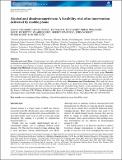Alcohol and disadvantaged men : a feasibility trial of an intervention delivered by mobile phone
Abstract
Introduction and Aims: Disadvantaged men suffer substantial harm from heavy drinking. This feasibility study developed and evaluated the methods for a trial of a brief intervention delivered by text messages to disadvantaged men. It aimed to test the methods for recruitment and retention, to monitor engagement with the intervention and assess the overall acceptability of study methods. Design and Methods: Disadvantaged men aged 25–44 years who had ≥2 episodes of binge drinking (≥8 units in one session) in the preceding month were recruited. Two recruitment strategies were assessed: recruitment from general practice registers and by a community outreach strategy. Theoretically and empirically based text messages were tailored to the target group. Results: The study recruited 67 disadvantaged men at high risk of alcohol-related harm, exceeding the target of 60. Evaluation showed that 95% of text messages were delivered, and the men engaged enthusiastically with the intervention. Retention at follow up was 96%. Outcomes were successfully measured on all men followed up. This provided data for the sample size calculation for the full trial. Post-study evaluation showed high levels of satisfaction with the study. Discussion and Conclusions: This study has shown that disadvantaged men can be recruited and follow-up data obtained in an alcohol intervention study. The study methods were acceptable to the participants. The men recruited were at high risk of alcohol-related harms. It also clarified ways in which the recruitment strategy, the baseline questionnaire and the intervention could be improved. The full trial is currently underway.
Citation
Crombie , I K , Irvine , L , Falconer , D W , Williams , B , Ricketts , I W , Jones , C , Humphris , G , Norrie , J , Slane , P & Rice , P 2017 , ' Alcohol and disadvantaged men : a feasibility trial of an intervention delivered by mobile phone ' , Drug and Alcohol Review , vol. 36 , no. 4 , pp. 468-476 . https://doi.org/10.1111/dar.12455
Publication
Drug and Alcohol Review
Status
Peer reviewed
ISSN
0959-5236Type
Journal article
Description
This project was funded by the UK National Institute for Health Research Public Health Research programme (09/3001/09).Collections
Items in the St Andrews Research Repository are protected by copyright, with all rights reserved, unless otherwise indicated.

